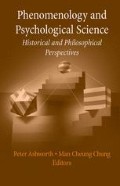Abstract
Husserl’s notion of transcendence has been and continues to be the source of much philosophical discussion and dispute among human science researchers. As long as there has been a phenomenological tradition there has been debate as to whether or not to follow Husserl’s ideas about transcendental phenomenology. Typically, such discussions easily become debates between extreme and opposing positions. One viewpoint sees transcendence as a notion of standing aside from one’s subjective experience, in order to observe the world or a particular phenomenon from a pure epistemological perspective, one of total objectivity. One might imagine a free-floating platform upon which the phenomenologist sits and that provides an unhindered view of the phenomenon in question. People defending this position put forward the notion that the reduction is a necessary part of a methodological approach that aims to be scientific. The other viewpoint holds that such a position of pure transcendence is impossible and that the transcendental idea was built on a false understanding. These critics deny the possibility of a pure consciousness. They emphasize that transcendence should be considered a hypothetical philosophical notion, which therefore ought to be discarded altogether. In the wake of this dispute is the debate about whether HusserFs well-known followers Heidegger, Merleau-Ponty, and Gadamer reject his idea of transcendentality or not. It is obvious that Husserl’s lifeworld theory became a substantial gift to subsequent philosophy, but whether or not Heidegger, Merleau-Ponty, and Gadamer also took up his transcendental phenomenology is more veiled.
Access this chapter
Tax calculation will be finalised at checkout
Purchases are for personal use only
Preview
Unable to display preview. Download preview PDF.
References
Ashworth, P. (1996). Presuppose nothing! The suspension of assumptions in phenomenological psychological methodology. Journal of Phenomenological Psychology, 27(1), 1–25.
Ashworth, P., & Lucas, U. (1998). What is the “World” of Phenomenography? Scandinavian Journal of Educational Research, 42(4), 415–431.
Bengtsson, J. (1993). Theory and Practice: Two fundamental categories in the philosophy of teacher education. Educational Review, 45(3), 205–211.
Bengtsson, J. (1995). What is reflection? On reflection in the teaching profession and teacher education. Teachers and Teaching: Theory and Practice, 1(1), 23–32.
Bengtsson, J. (1998). Fenomenologiska utflykter (Phenomenological excursions). Gothenburg, Daidalos.
Dahlberg, H., & Dahlberg, K. (2003). To not make definite what is indefinite. A phenomenological analysis of perception and its epistemological consequences. The Humanistic Psychologist, 31(4), 34–50.
Dahlberg, K., Drew, N., & Nyström, M. (2001). Reflective lifeworld research. Lund: Studentlitteratur.
Gadamer, H.-G. (1995). Truth and method (2nd rev. ed.) (J. Weinsheimer & D. Marshall, Trans.). New York: The Continuum Publishing Company. (Original work published 1960)
Gadamer, H.-G. (1998). Praise of theory. Speeches and essays (C. Dawson, Trans.). New Haven: Yale University Press. (Original work published 1983)
Giorgi, A. (1997). The theory, practice, and evaluation of the phenomenological method as a qualitative research procedure. Journal of Phenomenological Psychology, 28(2), 235–260.
Heidegger, M. (1962). Being and time (J. Macquarrie & E. Robinson, Trans.). Oxford: Blackwells. (Original work published 1927)
Husserl, E. (1970). The crisis of European sciences and transcendental phenomenology (D. Carr, Trans.). Evanston, IL: North Western University Press. (Original work published 1936)
Husserl, E. (1973). Experience and judgement (J.S. Churchill & K Ameriks, Trans.). Evanston, IL: North Western University Press. (Original work published 1948)
Husserl, E. (1977). Cartesian meditations (D. Cairns, Trans.). The Hague: Martinus Nijhoff. (Original work published 1929)
Husserl, E. (1998). Ideas pertaining to a pure phenomenology and to a phenomenological philosophy. First book. (F. Kersten, Trans.). Dordrecht: Kluwer Academic Publisher. (Original work published 1913)
Husserl, E. (2000). Ideas pertaining to a pure phenomenology and to a phenomenological philosophy. Second book. (R Rojcewicz & A. Schuwer, Trans.). Dordrecht: Kluwer Academic Publisher. (Original work published 1928)
Merleau-Ponty, M. (1968). The visible and the invisible (A. Lingis, Trans.). Evanston, IL: Northwestern University Press. (Original work published 1964)
Merleau-Ponty, M. (1987). Signs (R. McCleary. Trans.). Evanston, IL: North Western University Press. (Original work published 1960)
Merleau-Ponty, M. (1995). Phenomenology of perception (C. Smith, Trans.). London: Routledge. (Original work published 1945)
Merleau-Ponty, M. (2004). The world of perception (O. Davies, Trans.). London: Routledge. (Original work published 1948)
Author information
Authors and Affiliations
Editor information
Editors and Affiliations
Rights and permissions
Copyright information
© 2006 Springer Science+Business Media, LLC
About this chapter
Cite this chapter
Dahlberg, K. (2006). Did Husserl Change His Mind?. In: Ashworth, P.D., Chung, M.C. (eds) Phenomenology and Psychological Science. History and Philosophy of Psychology. Springer, New York, NY. https://doi.org/10.1007/978-0-387-33762-3_5
Download citation
DOI: https://doi.org/10.1007/978-0-387-33762-3_5
Publisher Name: Springer, New York, NY
Print ISBN: 978-0-387-33760-9
Online ISBN: 978-0-387-33762-3
eBook Packages: Behavioral ScienceBehavioral Science and Psychology (R0)

